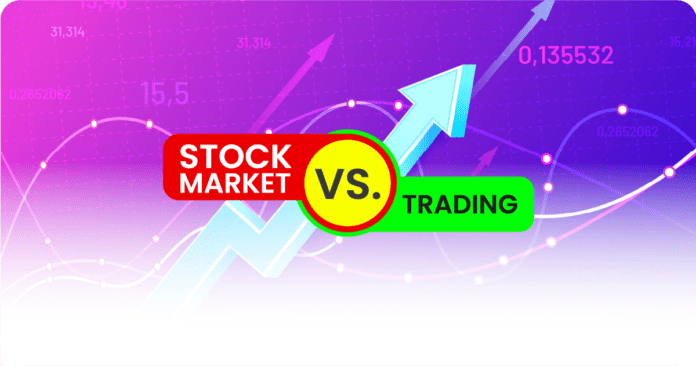Is stock market and day trading same?
The terms “stock market” and “trading” are often used interchangeably, confusing for newcomers. However, they represent different aspects of the financial world. It is important to understand their differences to navigate the market effectively.
The stock market is a vast and complex ecosystem where people buy and sell shares of ownership in publicly held companies. Imagine it as a marketplace, like a bustling city square, where people come together to exchange these shares, represented by certificates called stocks.
Trading is the fast-paced buying and selling of financial instruments like stocks, currencies, and commodities, aiming to profit from short-term price movements. It requires active analysis, carries high risk, and is not for everyone.

1. Timeframe:
- Stock market: Involves long-term investments (years to decades) with the aim of capital growth and dividend income.
- Trading: Focuses on short-term profits (days to weeks) by taking advantage of price fluctuations and market inefficiencies.
2. Strategy:
- Stock market: Relies on fundamental analysis to evaluate a company’s financial health, prospects, and intrinsic value.
- Trading: Uses technical analysis, which involves studying charts and price patterns to predict short-term market movements.
3. Risk profile:
- Stock market: Suitable for investors seeking long-term wealth accumulation with moderate risk tolerance.
- Trading: High, potential for significant gains and losses within short periods.
4. Psychological profile:
- Stock market: Requires patience, discipline, and a long-term mindset.
- Trading: Demands decisiveness, emotional control, and adaptability to rapid market changes.
5. Required investment:
- Stock market: Accessible with minimum capital and allows for gradual investment over time.
- Trading: May require larger initial capital to take advantage of opportunities and manage potential losses.

In conclusion, the financial landscape offers two distinct avenues: investing for long-term wealth accumulation and trading for capitalizing on short-term market movements. Understanding your circumstances, financial goals, and risk tolerance is paramount in choosing the path best suited for you. By navigating the market with a clear understanding of your investment objectives and risk profile, you can embark on a confident journey toward achieving your financial aspirations.
FAQ
What is the difference between trading and stock market?
Is stock market and day trading the same?
Is there any difference between the stock market and the stock exchange?
Which trading is good for beginners?












